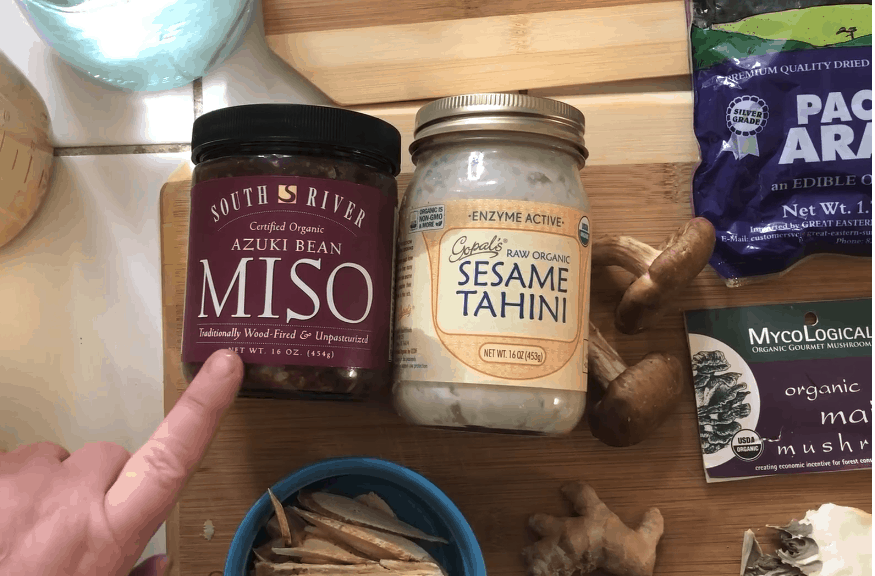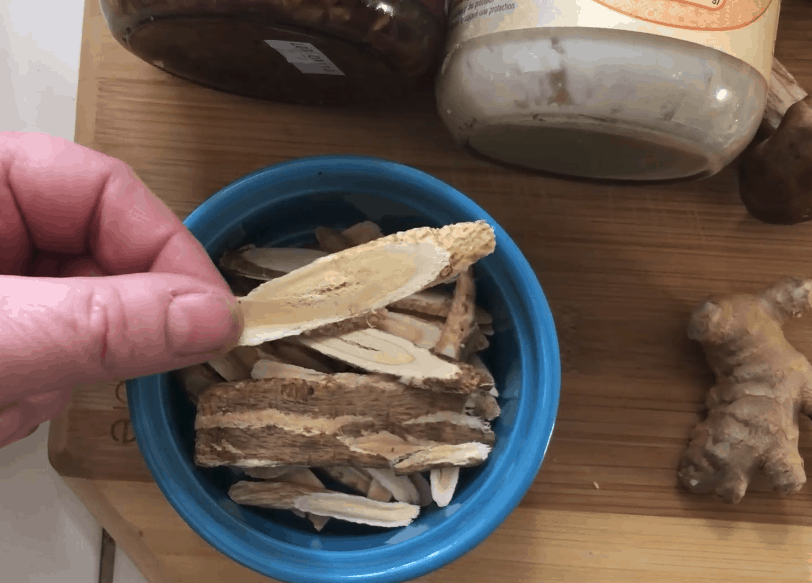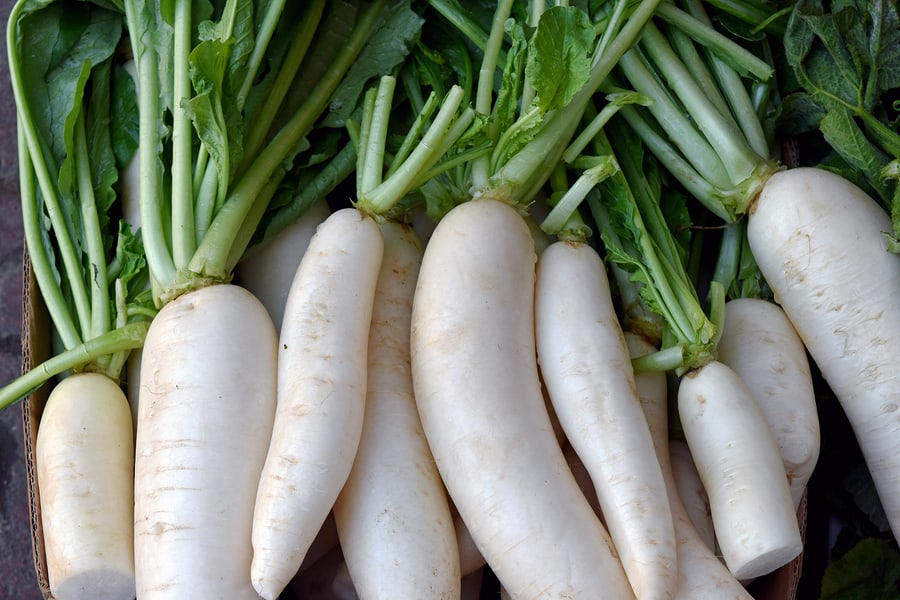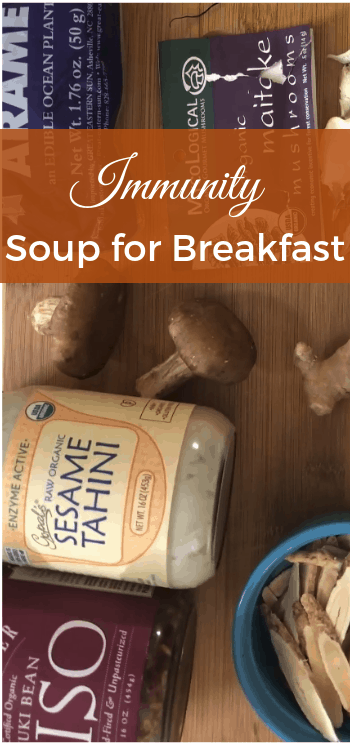Were you raised eating soup for breakfast?
I sure wasn’t. We ate Lucky Charms and Cheerios…and pop tarts! I know…
Fast forward.
Now, my favorite breakfast is soup! It’s warm and full of easy to digest nutrition so I don’t feel bogged down first thing in the morning when my digestive fire isn’t completely awake yet.
You can check out this video where I walk you step by step through how to make Immunity Soup, including:
- How to make mushroom broth
- How to think seasonally about why which vegetables are the best to use when
There’s also another variation of this recipe in my book, The Herbal Kitchen, you can check it out here.
I like to eat a light soup breakfast and then have the biggest meal of the day at lunch time.
Ayurveda teaches that your digestive capacity waxes and wanes with the sun. So, it makes sense that your best digestion takes place during mid-day.
Immunity Soup is one of my go-to breakfasts. It is the perfect breakfast food. Quick and easy to make, it’s full of protein, vitamins, minerals and hydrating electrolytes – it’s nutritious and satisfying yet doesn’t require a lot of digestive energy.
If you aren’t used to eating soup for breakfast, try it!
I make this soup for breakfast on my writing days, so that my energy doesn’t get stuck processing so much food and my brain can stay focused on my work.
Immunity Soup isn’t the kind of soup that you make a giant batch of and eat off of for several days, this soup is best made fresh each day. You can enjoy Immunity Soup any time of year. Here are some of the seasonal variations that are known to happen:
- More daikon in the spring
- Add some garlic in the winter to add to the immune boosting effect
- Add more greens in the summer (chard, kale…)
- Add root vegetables in the fall (finely cubed turnip, parsnip or rutabaga)

Miso
Miso is such a good food to have on hand. Think of it as healthy fast food! It only takes minutes to prepare and is full of protein, B vitamins and the healthy beneficial bacteria that you need to nourish your digestive tract. There are many varieties of Miso on the market, find one that you like and make sure it is unpasteurized and organic. I order miso from the South River Miso company and I like all their miso blends.
Tahini
Putting a little tahini into your soup makes it creamier and adds an easy to digest source of protein and calcium. In comparison to other nuts and seeds, sesame seeds have a higher healthy fat content and are high in protein. A dollop of tahini adds a nice nutty flavor and helps you start your day with an easy to assimilate protein.

Seaweed
Seaweed is one of those foods that you want to try and sprinkle into your meals as often as you can. You don’t need a lot, it’s a powerful superfood that can be added to your food in many ways. Soup is the perfect place to get a daily dose of seaweed. Seaweed contains protein, a broad range of vitamins and minerals including iron and calcium. It’s known to be a powerful anti-oxidant and beneficial pre-biotic that supports gut health and immunity.
Ginger
In my book The Herbal Kitchen, I talk about ginger being the universal medicine. As far as eating it for breakfast, it supports you in many ways. Ginger increases your digestive fire, so you can get your digestive juices moving first thing in the morning. It helps clear out any stagnation or left over undigested food from the previous day. It stimulates circulation and gets your blood moving so you can start your day with clarity.

Astragalus
Astragalus is one of the great immune boosting herbs that lends itself so well to putting in soups, it has a mildly sweet flavor, just make sure you remove it before serving though, or people will think you put wood in their soup! Astragalus increases the activity of NK cells (Natural Killer cells), which help the immune system track down and scavenge pathogenic bacteria in your body.

Daikon Radish
This cruciferous vegetable is heating, so it’s not for everyone. But if you benefit from a little spicy kick in your meals, this is a great vegetable to get to know. The most common way we see people eating daikon is in the fermented garnish ‘kim chee’, but it’s also a great addition to Miso soups. High in Vitamin C, potassium and other minerals, the spicy, bitter flavor of daikon tells you that it is also a good vegetable to help support liver function. Spring time is the best time to eat more daikon, as it helps the liver clear out stagnation that can sometimes build up in the winter.
Print out the recipe sheet for later and check out the video, my talk on the energetic qualities of the vegetables can be applied to more than this meal.
What’s your favorite soup?
Immunity Soup for Breakfast
Ingredients
- 2 cups water, vegetable or bone broth
- 3 tbsp Miso
- 1 cup chopped vegetables (zucchini, cabbage and bok choy, turnip)
- 1 handful chopped shitake mushrooms
- 1 tsp tahini
- 1 tsp hijiki or wakame seaweed (or your favorite seaweed)
- 1 finely grated ginger
- 1 tsp grated daikon radish
- 1 chopped scallion
- 4 thumb-length astragalus sticks
Instructions
Make mushroom broth in advance:
- Add 1 tablespoon crushed, dried maitake mushroom into 1 quart of water and let sit over night
Make the soup:
- Put one cup of the water or broth in a saucepan and turn on medium heat
- Add the ginger, astragalus, seaweed, mushrooms, chopped vegetables, scallions and simmer about 5 minutes until the vegetables are soft,. Turn the heat to low.
- Remove astragalus
- Put Miso into a small bowl, add a spoonful or two of broth and mash into a paste. Put Miso mixture into pot
- Turn off the stove
- Stir in tahini
- Add remainder of water or broth to saucepan
- Stir and serve.
- Garnish with scallions, chive or basil








Great video Kami – I’m so excited to make it!! I love how you eat a spoonful at the end – it always makes me want to make it and eat it too 🙂
I Love soup for breakfast!! the last couple years I have been moving away from trying to make myself eat more traditional breakfast things like hot cereal or smoothies which I just don’t have any interest in and letting myself eat things I am interested in like soup/congee for breakfast. I’m always excited to learn a new recipe for ingesting herbs for breakfast. Thank you for this share.
Your timing on this emailed recommendation is 👌 My diets been changing by purely listening to my body.
I can’t wait to try this soup of many variables, and to not be baffled by all the things I don’t want for breakfast.
Sowumm, thank you❣️
Hi Kami! does the mushroom infused water need to be infused overnight in the fridge? and if there is any leftover after making the soup, should it be refridgerated. Thanks so much!
You can put leftover in the fridge. Yes, please infuse it in the fridge
If the soup is hot when you add the miso, does the hot soup destroy the beneficial bacteria in the miso?
Yes, you want your miso soup to be warm not hot
Thank you Kami everything you do is delicious keep up the good work and the good education
so much needed in our world
Katy